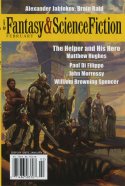
| Editor: | Gordon van Gelder |
| Issue: | Volume 112, No. 2 |
| ISSN: | 1095-8258 |
| Pages: | 162 |
Nothing much of unusual note in the non-fiction this issue. Michelle West and Kathi Maio do their regular excellent jobs at book and movie reviews respectively, and the other columns are par for the course.
The fiction this issue features an unusual (for F&SF) serialization: the first half of The Helper and His Hero by Matthew Hughes. With that plus two novelettes, there are fewer stories this issue, and only one of them really grabbed me.
"Brain Raid" by Alexander Jablokov: Ian McDonald has done AI hunters from the serious perspective better than anyone, but there's still material to be mined in the semi-humorous direction. Jablokov's world of gardening computers and home entertainmnet units run amok, freelance bounty hunters who take those AIs into captivity, and protestors and true believers who try to stop them is amusing and occasionally witty. The plot, involving a raid gotten out of hand and a slightly unbelievable conclusion, doesn't hold up as well, and the villains are cartoonish. Still, points for the setting and general entertainment. (6)
"Stone and the Librarian" by William Browning Spencer: I think William Browning Spencer is a great name to have if you're writing a Robert E. Howard pastiche. The story has a barbarian fighting against the oppression of the Librarian, who forces his hapless thralls to read page after page of Great Literature, and of course the works of Howard play an important role in the outcome. The premise is amusing as long as not taken too seriously, which Spencer is in no danger of doing. The story has little existence outside of the pastiche; it's all in the juxtaposition of style and subject material, becoming an homage to the grand old pulps. (6)
"The Helper and His Hero, Part 1" by Matthew Hughes: I do like Hughes (although I prefer Henghis Hapthorn to Guth Bandar), but the dry, distanced, mannerly style works better for me in short doses. Bandar's stories are adventure stories with only a few deeper resonances, and this one is no exception. At this length, I find it a bit wearing. I'm still interested, but Hughes is often compressible and I think this story could have been told at much less length. This is also why I've been avoiding Hughes's novels. (6)
"Red Card" by S.L. Gilbow: The best story of the issue, this is about a woman who murders her husband and the legal system in which this is a legal and praiseworthy action. Discovering the exact parameters of that system is much of the fun of the story, so I won't spoil it. I will say that Gilbow spins it into a surprisingly effective character study, a sharp look at the behavior of people around deterrants, and a twist ending that, while predictable, was quite satisfying. (7)
"Fool" by John Morressy: This was a disappointment; I kept expecting it to turn a deeper corner, but it never went anywhere. A person born deformed finds a position as a fool and confidant through his wits, and also steals a magical scroll that lets him kill three times during his life through magic. His first-person tale chronicles his rise to power, but there appears to be no telltale twist or turn that shows any deeper significance. Instead, it seems to be a straight portrait of a Machiavellian figure who triumphs. Maybe I missed something. (5)
Reviewed: 2007-04-16